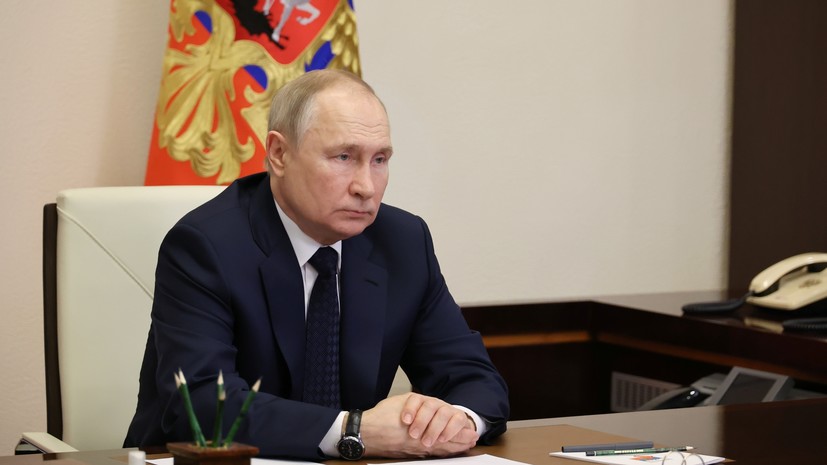The growth of consumer prices for goods and services in Russia continues to slow down.
At the same time, control over the situation remains one of the main tasks of the authorities.
On Tuesday, January 10, President Vladimir Putin drew attention to this during a meeting with the head of the Federal Antimonopoly Service (FAS) Maxim Shaskolsky.
“Now this is especially important.
True, at the moment we are still keeping inflation within certain limits: it is declining, it tends to decrease, ”Putin said.
During the discussion, the head of the FAS called the regulation of prices for socially significant goods a priority.
First of all, we are talking about food, medicines, petroleum products, building materials and cellular communication services.
As Shaskolsky emphasized, the food market in Russia is quite competitive and has a large number of participants.
In this regard, in order to contain food prices, the authorities are taking measures that contribute to an increase in crop volumes.
“For example, we control the procedure for allocating subsidies from the budget to agricultural producers ... Work is underway to provide our agricultural producers with mineral fertilizers in the required volume at affordable prices,” said the head of the service.
Also, according to him, in accordance with the instructions of the President in Russia, markups on socially significant products in federal retail chains were reduced four times - from 22 to 5.5%.
In addition, retailers have pledged to maintain markups no higher than 5% for the most sought-after goods - in categories such as bread, milk, sugar and borscht.
At the same time, 14,000 prices for essential medicines were revised in the country.
Of these, about 7 thousand were reduced by an average of 35%, added Shaskolsky.
The cost of building materials in Russia at some point increased as a result of the actions of a number of companies, the head of the FAS noted.
According to him, some entrepreneurs preferred to increase the supply of their products abroad rather than to the domestic market, which led to a rise in the cost of goods in the country.
However, now the situation has stabilized.
“We conducted a number of investigations, initiated cases against metallurgists, against manufacturers of materials from wood, from aerated concrete, glass.
Investigations are ongoing.
We can say that this is also why (at the moment. -
RT
) there is a decrease in prices for a number of building materials, ”Shaskolsky emphasized.
RIA News
© Vitaly Ankov
In general, as experts explain, control over consumer prices is necessary, since an excessive rise in the cost of goods leads to a decrease in the effective demand of the population and acceleration of inflation.
And this, in turn, turns into a fall in the real incomes of citizens, which the country's leadership is trying to avoid.
“That is why the authorities should apply control mechanisms.
But you need to do it carefully.
The main thing is not to switch to direct price regulation, but to work on withdrawing monopolists from the market and developing fair competition, ”said Georgy Ostapkovich, director of the Center for Market Research at the HSE Institute for Statistical Studies and Economics of Knowledge, in an interview with RT.
A similar point of view in a conversation with RT was expressed by the head of the analytical department of AMarkets Artyom Deev.
As the expert emphasized, control over prices for goods of strategic importance should play a key role.
“Change in the cost of bread, sugar, flour and other products can cause social tension.
Moreover, such an increase in the cost of basic goods may not always be justified by manufacturers or retailers.
Of course, these price changes eventually affect inflation in the country, which is why state control of these processes is needed,” Deev added.
Price slowdown
According to preliminary estimates from Rosstat and the Ministry of Economic Development, in 2022, food prices in Russia increased by an average of 10.34%.
Salt (by 26%), rice (by 25.1%), tea (by 21.5%), canned vegetables (by 18.9%) and beef (by 16%) went up the most.
At the same time, some goods, on the contrary, have noticeably fallen in price.
We are talking, for example, about cabbage (by 53.3%), potatoes (by 31.2%) and carrots (by 16.8%).
Non-food products increased in price by an average of 12.55%.
Cars in Russia have risen in price by an average of 30-39% over the year, medicines - by 11%, building materials - by 2.9%, and gasoline - by only 0.93%.
The overall inflation rate in 2022 was about 12.2%.
At the same time, in April, the indicator briefly rose to almost 18%.
At that moment, large-scale Western sanctions against Russia provoked a panic in the financial and consumer markets of the country, the ruble exchange rate collapsed to record levels, and the population began to massively buy food.
However, due to the initiatives taken by the authorities, the situation in the economy was stabilized and price growth began to slow down.
According to Georgy Ostapkovich, in 2023 inflation in Russia may slow down to 6-8% if the current geopolitical conditions remain unchanged.
As noted by the specialist, at the moment the pressure on prices is exerted by weak consumer demand.
“There are a number of other factors: for example, increased competition in the market for the consumer, as well as an increase in supply and an expansion of the range of goods.
When there is a variety of products, its cost becomes lower, as the seller has to fight for the buyer.
It is also necessary to reduce the cost of loans for Russians, as expensive loans lead to an increase in the cost of servicing them.
And of course, we need to work on the growth of real disposable income, ”concluded the economist.

